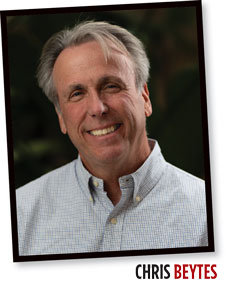8/1/2024
Observations from Cultivate’24
Chris Beytes

Another Ohio is in the books (okay, okay, Cultivate, but you old timers know what I mean; I could have also called it Short Course and you’d have smiled in appreciation of the historical reference) and there’s every indication it was a good one. An official-official from AmericanHort, the show owners/organizers, couldn’t give me any attendance figures other than to say that pre-registrations were up “by almost double digits” over previous years, which reflects optimism leading up to the event. A non-official-official I spoke with Monday night hinted at attendance numbers that sounded almost too good to be true, so I won’t repeat them here. Suffice it to say that anybody who is anybody—plus everybody else—seemed to be walking the aisles.
And also attending educational sessions. Regretfully, I was unable to attend the Monday morning State of the Industry session, which brings us all up to date on the association, Washington and the economy, but I was told the 1,000-seat auditorium was standing-room-only and overflowing. Everyone wants to know what Ken Fisher (AmericanHort’s President and CEO), Matt Mika (AmericanHort’s VP of Advocacy & Government Affairs) and Dr. Charlie Hall (AmericanHort’s Chief Economist) had to say.
I was able to connect with Charlie later to find out what he told the audience. Based on his data from 110 EAGL* and Your MarketMetrics from growers, Spring 2024 was a season of “mixed performance.” A third of the participants were up in gross sales over last year, a third were about flat or up slightly, and a third were down. In units sold, about half were up and about half were down. And in bottom-line net profit, almost exactly half were up and half were down. Mixed says it! (While not scientific like Charlie’s data, my weekly sales survey showed the same mixed results.)
What does it mean to you going forward? Three of Charlie’s take-home messages were: “Manage your working capital,” “SKU rationalization,” and “Focus on your value proposition.” Sound advice for all businesses at all times.
My main beat on the trade show is mechanization and I found some good stuff (which you can find in a video on the GrowerTalks' YouTube channel) for all budgets. For instance, I saw a new autonomous plant mover called Burro that hauls trains of racks or wagons around your nursery or greenhouse with no operator needed. That’s $38,000 a piece per kit (but still cheaper than a worker on a tractor). Or, for just $400, you can buy a powered applicator that cuts the time it takes to spread beneficial insects on 1 acre of crops from one hour to just 10 minutes—an 83% improvement—and do it more gently and more evenly.
Regarding beneficials, part of Tech on Demand Editor Bill Calkins’ trade show beat was looking for biosolutions and he told me he’s seeing a “mass migration” of growers toward the use of biological controls (he’s the one who turned me on to the $400 beneficials spreader above, which you can also see in my video). There were more educational sessions on the topic than ever, more companies offering products and information, and more growers talking about utilizing them. It’s still a new field and biosolutions have to work hand-in-hand with traditional controls, but it’s now mainstream, not the fringe.
Also becoming more mainstream is sustainability. I stepped off the trade show floor for a couple hours on Monday to moderate a panel discussion on that very topic and my audience learned a lot from my four experts. One of my panelists was Scott Zock, COO of Westerlay Orchids in Carpinteria, California, where sustainability is part of their DNA. One of my last questions was one some audience members might have been thinking: “Why bother with this whole sustainability thing? It sounds like a lot of work and a lot of money?” Scott gave four fantastic reasons:
1. “It’s better to be the peer-leader when engaging your customers.”
2. “So you don’t get caught flat-footed when your customers communicate an expectation around sustainability.”
3. “When done well, you will be focused on some of the most important parts of your P&L and exploring solutions that improve quality, save money, reduce waste and/or improve safety.”
4. “It’s an area of your business that can ‘raise the bar’ on your competition and make you more competitive.”
All in all, Cultivate’24 was an outstanding event, full of education and shopping opportunities. But, most of all, so was the networking. If you weren’t there talking with your peers, competitors and suppliers, you missed a chance to better prepare yourself for the coming seasons. GT